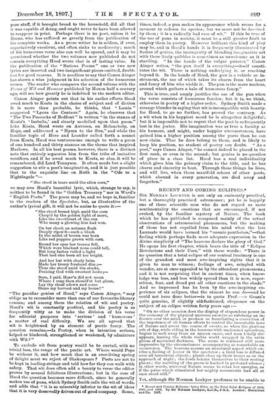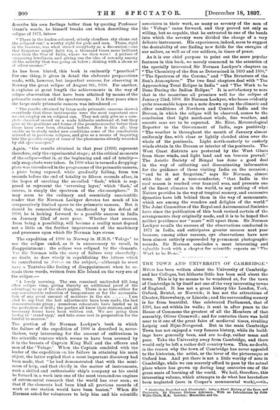RECENT AND COMING ECLIPSES.*
SIR NORMAN LOCKYER is not only an eminently practical, but a thoroughly practised astronomer; yet he is happily one of those scientific men who do not regard as mere
sentimentality the emotions that are encouraged, if not evoked, by the familiar mystery of Nature. The book which he has published is composed mainly of the actual observations of astronomical phenomena, but the making of these has not expelled from his mind what the late Laureate would have termed his "cosmic pantheism,"—that feeling which perhaps finds most adequate expression in the divine simplicity of "The heavens declare the glory of God." He opens his first chapter, which bears the title of "Eclipse Revelations and their Uses," with these words : "There is no question that a total eclipse of our central luminary is one of the grandest and most awe-inspiring sights that it is given to man to witness ; feelings of awe, mingled with wonder, are at once appealed to by the attendant phenomena; and it is not surprising that in ancient times, when know- ledge was less, and less widely spread than it is now, super- stition, fear, and dread put all other emotions in the shade." And so impressed has he been by the awe-inspiring ex- perience of six eclipses, that the utmost he can do—and he could not have done better—is to quote Prof, ,.gor Grant's quite genuine, if slightly old-fashioned, eloquence on the subject of an eclipse written forty years ago :—
" On no other occasion does the display of stupendous power in the economy of the physical universe exercise so subduing an in- fluence over the mind, or produce so humiliating a conviction of the impotence of all human efforts to control the immutable laws of Nature and arrest the course of events, as when the glorious orb of day, while riding in the heavens with unclouded splendour, begins to melt away from an unseen cause, and soon totally dis- appears, leaving the whole visible world wrapped in the sable gloom of nocturnal darkness. The scene is rendered still more impressive by the circumstances accompanying so remarkable an occurrence. The heavens assume an unnatural aspect which ex- cites a feeling of horror in the spectator ; a livid hue is diffused over all terrestrial objects ; plants close up their leaves as on the approach of night ; the fowls betake themselves to their resting places ; the warbling of the grove is hushed in profound silence ; in other words, universal Nature seems to relax her energies, as if the pulse which stimulated her mighty movements had all at once stood still."
Yet, although Sir Norman Lockyer professes to be unable to • Recent and Coming Eclipses: being Notes on the Total Solar Eclipses of 1893, 1893. and 1898. By Sir Norman Leakier, KALB., I.R.S. London: Macmillan and O. 1897.
describe his own feelings better than by quoting Professor Grant's words, he himself breaks out when describing the eclipse of 1871, into-
" There in the leaden-coloured, utterly cloudless sky shone out the eclipsed sun ! a worthy sight for gods and men. There, rigid in the heavens, was what struck everybody as a decoration—one that Emperors might fight for, a thousand times more brilliant even than the Star of India, where we then were ! A picture of e,urpassing loveliness, and giving one the idea of serenity among all the activity that was going on below; shining with a sheen as of silver essence."
As has been hinted, this book is eminently "practical." For one thing, it gives in detail the elaborate preparations made, with, however, but imperfect success, for observing in Norway the great eclipse of August 9th, 1896. For another, it explains at great length the achievements in the way of eclipse observation that have been attained by means of the prismatic camera and the spectroscope. It is four years since the large-scale prismatic camera was introduced :—
" The results obtained by large-scale prismatic cameras showed everybody that these instruments were the most important ones we can employ on an eclipsed sun. They not only give us a com- plete chemical record on a scale hitherto undreamt of, but they give us the positions and forms of the prominences far better than these have ever been obtained before. Nor is this all ; they enable us to study under new conditions some of the conclusions arrived at in previous eclipses, and give us a means of inquiring into the possible origin of some of the phenomena already recorded by slit spec:roscopes."
Again, "the results obtained in that year (1893) represent therefore, only the experimental stage ; at the critical moments of the eclipse—that is, at the beginning and end of totality— only snap-shots were taken. In 1896 what is termed a dropping- plate was introduced in the programme of the prismatic camera, a plate being exposed, while gradually falling, from ten seconds before the end of totality to fifteen seconds after, in the hopes of catching the so-called flash,' which is sup- posed to represent the reversing layer,' which flash,' of course, is simply the spectrum of the chromosphere." It may seem to the ordinary and essentially unscientific reader that Sir Norman Lockyer devotes too much of his comparatively limited space to the prismatic camera. But it should be remembered that, unaffected by the defeat of 1896, he is looking forward to a possible success in India on January 22nd of next year. Whether that success, from being a possibility, will become a reality must depend not a little on the further improvement of the machinery and processes upon which Sir Norman lays stress.
The expedition of 1896 to Norway in H.M.S. Volage ' to see the eclipse ended, as it is unnecessary to recall, in
disappointment ; the eclipse was eclipsed by the elements. Yet Sir Norman tells the story of failure very cheerfully ; no doubt he does wisely in republishing the letters which he contributed to Nature on the subject,—although he must have a Tantalus-like feeling of disappointment when he re- reads these words, written from Kio Island on the very eve of the eclipse :— " A lovely morning. The sun remained unclouded till long after eclipse time, giving thereby an additional proof of the advantage to us of the short nights. There is no time either for any considerable reduction of temperature or for the accumula-
tion of any great amount of moisture in the air I am glad to say that the last adjustments have been made, the last demonstrations given ; numerous rehearsals have landed us in the perfection of drill ; the parties all know their stations, and all necessary forms have been written out. We are going then to-day to 'stand easy,' and take some rest in preparation for the fateful to-morrow."
The portion of Sir Norman Lockyer's book in which the failure of the expedition of 1896 is described is, never- theless, very interesting for the amount of enthusiasm in the scientific venture which seems to have been aroused by it in the breasts of Captain King Hall and the officers and
men of the Volage.' When the Captain condoled with the leader of the expedition on his failure in attaining his main object, the latter replied that a most important discovery had been made, that "he had demonstrated that with the mini- mum of help, and that chiefly in the matter of instruments, such a skilled and enthusiastic ship's company as his could be formed in a week into one of the most tremendous engines of astronomical research that the world has ever seen; so that if the elements had been kind all previous records of work at one station would have been beaten." When Sir Norman asked for volunteers to help him and his scientific
associates in their work, as many as seventy of the men of the Volage ' came forward, and they proved not only so willing, but so capable, that he entrusted to one of the bands into which the seventy were divided the charge of a very delicate instrument. His experiences, indeed, seem to suggest the desirability of our finding new fields for the energies of our sailors, as well as of our soldiers, in times of peace.
As it is our chief purpose to point out the more popular features in this book, we merely commend to the attention of the specially interested Sir Norman Lockyer's chapters on "The Chemistry of the Sun as Determined in 1893 and 1896," "The Spectrum of the Corona," and "The Structure of the Sun's Atmosphere." The two final chapters deal with "The Approaching Total Eclipse in India" and "The Work to be Done During the Indian Eclipse." It is satisfactory to note that in the meantime all promises well for the eclipse of January 22nd, 1898. Sir Norman Lockyer, who bases evidently quite reasonable hopes on a note drawn up on the climatic and other conditions of Northern and Central India and the Deccan, in which the eclipse will be observed, comes to the conclusion that light north-east winds, fine weather, and smooth seas are to be expected. Mr. Eliot, Meteorological Reporter to the Government of India, says positively : "The weather is throughout the month of January almost uniformly fine, with clear or lightly clouded skies over the whole of the peninsula. Light north-easterly to easterly winds obtain in the Deccan or interior of the peninsula. The West Coast districts are protected by the West Ghats from these winds, and light land and sea breezes prevail." The Asiatic Society of Bengal has done a good deal in the way of collecting and disseminating information for the guidance of those visiting India on the occasion ; "and be it not forgotten," says Sir Norman, almost with the air of a tour-conductor, "that India in the cool season is reached over tranquil seas, and presents one of the finest climates in the world, to say nothing of what Nature provides in the way of tropical scenery, and successive dynasties have left behind them in the way of monuments, which are among the wonders and delights of the world." The Joint Committee of the Royal and Astronomical Societies have since the publication of this book revised certain of the arrangements they originally made, and it is to be hoped that neither pestilence nor " scare " will upset them. Sir Norman Lockyer recalls the success of the observations conducted in 1871 in India, and anticipates greater success next year because, among other reasons, eye observations have now been almost entirely superseded by permanent photographic records. Sir Norman concludes a most interesting and valuable book with a chapter for scientific experts on "The Work to be Done."







































 Previous page
Previous page